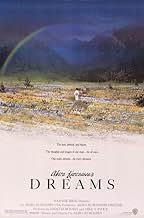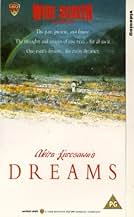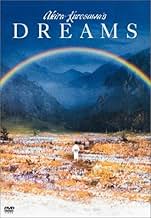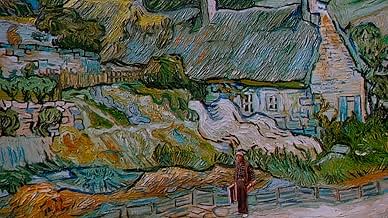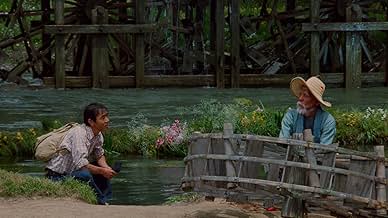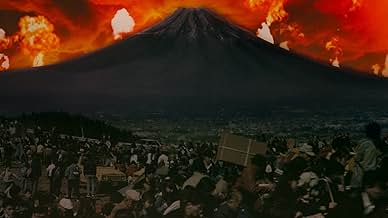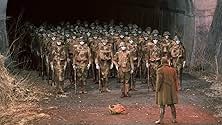IMDb रेटिंग
7.7/10
31 हज़ार
आपकी रेटिंग
अपनी भाषा में प्लॉट जोड़ेंA collection of tales based upon eight of director Akira Kurosawa's recurring dreams.A collection of tales based upon eight of director Akira Kurosawa's recurring dreams.A collection of tales based upon eight of director Akira Kurosawa's recurring dreams.
- निर्देशक
- लेखक
- स्टार
- पुरस्कार
- 3 जीत और कुल 12 नामांकन
फ़ीचर्ड समीक्षाएं
Dreams is not a movie for everybody. To some, it may be too artsy of a film for their tastes (what are you doing watching movies then?), others may be annoyed by some of the stories not having clear messages, or leaving questions unanswered. Well, that is because Dreams is a film that was born inside of Kurosawa, and lives inside of him, it's a very personal film that not everybody will appreciate.
The movie consists of eight short stories. Most of which center around the issue of people's relationships with other elements that make up this world that we live in.
The cinematography in Dreams is breathtaking, and is the reason why some people claim that it is a film that puts "Style" above "story". I think that nobody can truly completely understand this film but Kurosawa himself. It is a product of his mind, a film that we cannot fully comprehend since we are not him. But since film is a form of art and in its truest form, a reflection of one's own self, Dreams may have just been one of Kurosawa's personal favorites in his long, amazing career.
The movie consists of eight short stories. Most of which center around the issue of people's relationships with other elements that make up this world that we live in.
The cinematography in Dreams is breathtaking, and is the reason why some people claim that it is a film that puts "Style" above "story". I think that nobody can truly completely understand this film but Kurosawa himself. It is a product of his mind, a film that we cannot fully comprehend since we are not him. But since film is a form of art and in its truest form, a reflection of one's own self, Dreams may have just been one of Kurosawa's personal favorites in his long, amazing career.
I was pleasantly surprised with dreams, not only in terms of content but also aesthetically. There are very few films that manage to embody personal, local and global concerns as Akira Kurosava has managed in this production. There are so many underlying topics that it is difficult to concentrate in just a few for the purpose of this review, but I believe it is fair to say that Dreams portrays our individual and collective dreams and nightmares, reflecting that sometimes what we dream of today is what will keep us awake tomorrow. A nice range of representations of concerns from the deepest and most personal childhood worries and fantasies to the more complex issues of mental illness, extreme ambition, destruction of our environment and death. In all I recommend this film to anyone who has the chance to see it, It is possible that Dreams may not appeal to a mainstream audience in terms of content because there is a lot of symbolism and critical engagement but the photography and sceneries are for sure something that should not go amiss for anyone. If you get the chance it is truly worth giving it your time, a fantastic experience.
Truly one of the most beautiful films I have ever seen. I saw this film for the first time in 1993 and it was placed forever in my mind as one of my greatest cinematic experiences. I agree with what another reviewer said about this film, that it is not for everyone. It is very artistic in that the cinematography carries a lot of the story and some may become bored with it. Hollywood has a way of brainwashing a lot of viewers into needing a lot of dialog or action. If that's what you're after, you wont find it here. You have to use your brain for this one. This movie is Japanese and what little dialog there is, is in subtitled for the American viewer. So you may need to do a little reading. This is not simply a movie; it is several short, amazing stories that stem from the mind of Akira Kurosawa (a genius in my book). One is like a beautiful fairytale and another is a nightmarish fable and still another is a terribly haunting ghost story, there are others but all are done very well. This film needs to be seen in the letterbox format as it was intended. The cinematography, as I said earlier, contributes so much that it should be viewed completely. I really don't know what else to say about this movie except that if you have an artistic streak and like to see how movies can become art I would highly recommend Yume (Dreams).
Akira Kurosawa's insights on man's need to harmonize with nature, the costs of war and the bad fruits that nuclear power can bear. This is the first Kurosawa movie I have seen, but I can see how true it is that Kurosawa is a master of creating atmosphere in a film. Such as the dark, post-nuclear apocalyptic world of THE WEEPING DEMON. Or the very first episode when the little boy sees something he is not supposed to see in the forest.
I found THE BLIZZARD rather strange, and you'll see a scary part when the mountainman is having his mirage of the beautiful woman who symbolizes the snowstorm. I'm not sure what the significance of the dog was in THE TUNNEL, but I guess it illustrates the fact that though he was the commander of Third Platoon , he felt like a coward because of his command, his men paid the price.... yet he is guilty of still being alive; he's afraid of the dog.
It ends rather low key, but the last episode THE VILLAGE IN THE WATERMILLS is the most insightful and bold in expressing the movie's theme... of harmonizing with nature, and maybe harmonizing with ourselves.
The procession displays the unity and the communal harmony that the villagers have. And it is the exact opposite of what is grieved about in MOUNT FUJI IN RED or THE WEEPING DEMON. The cinematography is just beautiful. The movie is beautiful and captivating.
Akira Kurosawa's YUME is Grade A- 9/10
I found THE BLIZZARD rather strange, and you'll see a scary part when the mountainman is having his mirage of the beautiful woman who symbolizes the snowstorm. I'm not sure what the significance of the dog was in THE TUNNEL, but I guess it illustrates the fact that though he was the commander of Third Platoon , he felt like a coward because of his command, his men paid the price.... yet he is guilty of still being alive; he's afraid of the dog.
It ends rather low key, but the last episode THE VILLAGE IN THE WATERMILLS is the most insightful and bold in expressing the movie's theme... of harmonizing with nature, and maybe harmonizing with ourselves.
The procession displays the unity and the communal harmony that the villagers have. And it is the exact opposite of what is grieved about in MOUNT FUJI IN RED or THE WEEPING DEMON. The cinematography is just beautiful. The movie is beautiful and captivating.
Akira Kurosawa's YUME is Grade A- 9/10
Sentimentally I love this film, made by Kurosawa when he was 80 and one of his last. The great director gives us eight vignettes that often seem more like messages than dreams, speaking to the danger of nuclear power, damaging the environment, and senseless death in war. Guilt is a recurring theme, and as the film covers childhood to old age, it seems very personal to Kurosawa's own life. The images are often beautiful, and I absolutely loved dream #5, "Crows," where an art student runs through Van Gogh's paintings and meets him. The highlighted work, "Wheatfield with Crows" is so profoundly meaningful to the end of Van Gogh's life that seeing it here in the elderly Kurosawa's work gave me goosebumps. I didn't mind the preachiness that's in several of the other dreams too much, though it did take away from the film's surreal feeling, but the bigger issue was pace, which was almost always too slow. It's a must-watch film for fans of Kurosawa and I'm glad I saw it, but it needing paring down.
क्या आपको पता है
- ट्रिवियाAkira Kurosawa had trouble getting financing from studios in Japan, blaming much on the political nature of his criticism of nuclear power in the film. He sent a copy of his script to Steven Spielberg, who liked it, and helped get a deal for the film through Warner Bros.
- कनेक्शनEdited into Gli ultimi giorni dell'umanità (2022)
- साउंडट्रैकIn the Village
(from "Caucasian Sketches, Suite for Orchestra Op. 10, No. 2")
Music by Mikhail Ippolitov-Ivanov (as Ippolitov-Ivanov)
Conducted by Vladimir Fedoseyev (as Vladimir Fedoseev)
Performed by Moscow Radio Symphony Orchestra
टॉप पसंद
रेटिंग देने के लिए साइन-इन करें और वैयक्तिकृत सुझावों के लिए वॉचलिस्ट करें
- How long is Dreams?Alexa द्वारा संचालित
विवरण
बॉक्स ऑफ़िस
- बजट
- $1,20,00,000(अनुमानित)
- US और कनाडा में सकल
- $19,63,207
- दुनिया भर में सकल
- $29,70,161
- चलने की अवधि
- 1 घं 59 मि(119 min)
- रंग
- ध्वनि मिश्रण
- पक्ष अनुपात
- 1.85 : 1
इस पेज में योगदान दें
किसी बदलाव का सुझाव दें या अनुपलब्ध कॉन्टेंट जोड़ें



